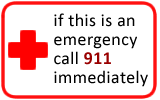Headache
Headache
Does this describe your symptoms? |
Definition
Common Causes
Some Serious Causes of Headache
|
If not, see these topics
|
When to Call Your Doctor |
Call 911 Now (you may need an ambulance) If |
|
|
|
Call Your Doctor Now (night or day) If |
|
|
|
Call Your Doctor Within 24 Hours (between 9 am and 4 pm) If |
|
|
|
Call Your Doctor During Weekday Office Hours If |
|
|
|
Self Care at Home If |
|
|
HOME CARE ADVICE FOR HEADACHE |
Migraine Headache:
Migraine headaches are also called vascular headaches. A migraine can be anywhere from mild to severely painful. Sufferers often describe it as throbbing or pulsing. It is often just on one side.
Associated symptoms include nausea and vomiting. Some individuals will have visual or other neurological warning symptoms (aura) that a migraine is coming.
Muscle Tension Headache:
The majority of headaches are caused by muscle tension.
The discomfort is usually diffuse and may be described as a "tight band" around the head. It may radiate down into the neck and shoulders. The discomfort can be aggravated by emotional stress.
This sounds like a painful headache that you are having, but there are pain medications you can take and other instructions I can give you to reduce the pain.
Pain Medicines:
For pain relief, take acetaminophen, ibuprofen, or naproxen.
Acetaminophen (e.g., Tylenol):
Take 650 mg by mouth every 4-6 hours. Each Regular Strength Tylenol pill has 325 mg of acetaminophen.
Another choice is to take 1,000 mg every 8 hours. Each Extra Strength Tylenol pill has 500 mg of acetaminophen.
The most you should take each day is 3,000 mg.
Ibuprofen (e.g., Motrin, Advil):
Take 400 mg by mouth every 6 hours.
Another choice is to take 600 mg by mouth every 8 hours.
Use the lowest amount that makes your pain feel better.
Naproxen (e.g., Aleve):
Take 250-500 mg by mouth every 12 hours.
Use the lowest amount that makes your pain feel better.
Extra Notes:
Acetaminophen is thought to be safer than ibuprofen or naproxen in people over 65 years old. Acetaminophen is in many OTC and prescription medicines. It might be in more than one medicine that you are taking. You need to be careful and not take an overdose. An acetaminophen overdose can hurt the liver.
Caution: Do not take acetaminophen if you have liver disease.
Caution: Do not take ibuprofen or naproxen if you have stomach problems, kidney disease, are pregnant, or have been told by your doctor to avoid this type of medicine. Do not take ibuprofen or naproxen for more than 7 days without consulting your doctor.
Before taking any medicine, read all the instructions on the package
Migraine Medication: If your doctor has prescribed specific medication for your migraine, take it as directed as soon as the migraine starts.
Rest: Lie down in a dark, quiet place and try to relax. Close your eyes and imagine your entire body relaxing.
Local Cold: Apply a cold wet washcloth or cold pack to the forehead for 20 minutes.
Stretching: Stretch and massage any tight neck muscles.
Call Your Doctor If:
Headache lasts longer than 24 hours
You become worse
And remember, contact your doctor if you develop any of the "Call Your Doctor" symptoms.
Updated:
March 22, 2017



